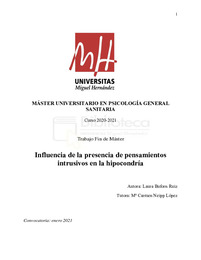Título :
Influencia de la presencia de pensamientos intrusivos en la hipocondría |
Autor :
Buforn Ruiz, Laura |
Tutor:
Neipp López, María del Carmen |
Editor :
Universidad Miguel Hernández de Elche |
Departamento:
Departamentos de la UMH::Psicología de la Salud |
Fecha de publicación:
2021-01-20 |
URI :
http://hdl.handle.net/11000/26578 |
Resumen :
Los pensamientos intrusivos sobre la salud/enfermedad, las valoraciones e interpretaciones sobre
ellos y los síntomas que sufren, así como las creencias disfuncionales sobre la salud, son factores
de riesgo para el desarrollo de la hipocondría. Es por lo que el objetivo de este estudio fue
evaluar la posible relación que tiene la presencia de pensamientos intrusivos sobre la
salud/enfermedad en la hipocondría. La muestra seleccionada para ello fueron 83 personas de la
provincia de Alicante, con edades comprendidas entre los 18 y 40 años (M= 25.06, DT= 4.48).
La evaluación se llevó a cabo de forma telemática y los instrumentos utilizados fueron un ad hoc
para medir las variables sociodemográficas, El INPIE-R (Inventario de pensamientos intrusos
sobre la enfermedad-revisado), el WI (Índice Whiteley) y el SOMS-2 (Screening for somatoform
symptoms-2). Los resultados muestran que los pensamientos que aparecen ante la presencia de
síntomas físicos y/o al recibir información relacionada sobre la salud era la intrusión que
percibían como más molesta, creían que era importante controlar esa intrusión, les generaba
incertidumbre y utilizaban técnicas de detención del pensamiento para controlarla, que existen diferencias estadísticamente significativas en las personas que experimentan sintomatología con
los que no en el tipo de intrusiones que presentan y que la gente con tendencia hacia la
hipocondría tiene más intrusiones que las que no. En conclusión, se considera que la presencia de
pensamientos intrusivos es una variable relevante para el desarrollo de la hipocondría.
Intrusive thoughts about health/illness, assessments and interpretations about them and the
symptoms they suffer, as well as dysfunctional beliefs about health, are risk factors for the
development of hypochondria. For this reason, the objective of this study was to evaluate the
possible relationship between the presence of intrusive thoughts about the health/illness in
hypochondria. The sample selected for this was 83 people from the province of Alicante, aged
between 18 and 40 years (M = 25.06, DT = 4.48). The evaluation was carried out electronically
and the instruments used were an ad hoc tool to measure sociodemographic variables, the INPIER
(Inventory of intrusive thoughts about the disease-revised), the Whiteley Index (WI) and the
SOMS-2 (Screening for somatoform symptoms-2). The results show that the thoughts that
appear when they have physical symptoms and/or when they receiving information related to
health was the intrusion that they perceived as the most annoying, they believed that it was
important to control this intrusion, they had uncertainty and they used thought stopping
techniques to control it. In addition, there are statistically significant differences between people
who experience symptoms and those who do not in the type of intrusions they have and that
people with a tendency towards hypochondria have more intrusions than those who do not. In
conclusion, it is considered that the presence of intrusive thoughts is a relevant variable for the
development of hypochondria.
|
Palabras clave/Materias:
hipocondría
ansiedad
pensamientos intrusivos |
Área de conocimiento :
CDU: Filosofía y psicología: Psicología |
Tipo documento :
application/pdf |
Derechos de acceso:
info:eu-repo/semantics/openAccess
Attribution-NonCommercial-NoDerivatives 4.0 Internacional |
Aparece en las colecciones:
TFM- M.U en Psicología General Sanitaria
|
 La licencia se describe como: Atribución-NonComercial-NoDerivada 4.0 Internacional.
La licencia se describe como: Atribución-NonComercial-NoDerivada 4.0 Internacional.
.png)
